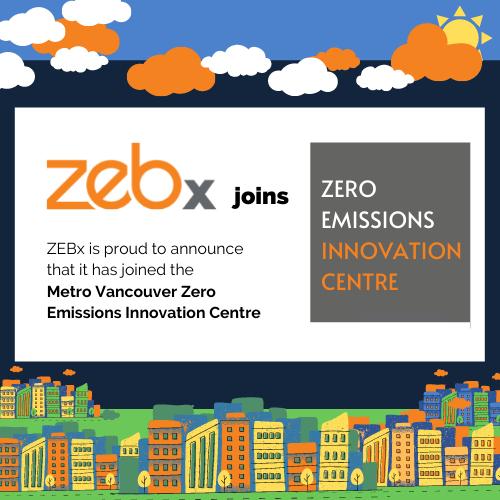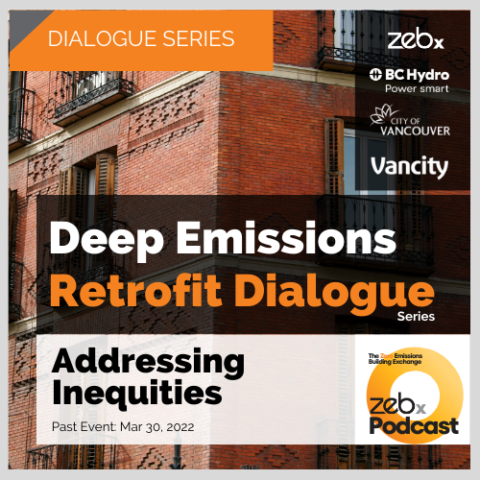
Mar 2022 Decarb Lunch Podcast: SFU Parcel 21: Achieving Step 4 at Conventional Construction Budgets
April 1, 2022
ZEBx joins ZEIC
April 6, 2022
Deep Emissions Retrofit Dialogue Six – Addressing Inequities
Recorded at Past Event: Mar 30, 2022
Slides:
This event was a collaboration with B2E featuring the BC Non-Profit Housing Association.
Summary
The March 2022 Deep Emissions Retrofit Dialogue dove into one of the three topics covered in our January 2022 Dialogue – Equity. As we decarbonize the existing building stock through a combination of deep emissions retrofits and energy conservation measures, we need to be mindful of how it will impact vulnerable segments of British Columbia’s population. This includes low-income households.
Equity, Electrification and Home Energy Retrofits in BC
Presented by Dylan Heerema, Ecotrust Canada
According to a March 2021 EcoTrust Canada report, approximately 15%, or 272,000 households experience energy poverty in B.C.. These households experience a median energy cost burden of 9.3%, three times that of all B.C. households. Despite having one-half the income levels, B.C. homes in energy poverty also have home energy costs that are 50% higher than the provincial average. Using electric baseboard heating or an oil-fired furnace to heat a home with a poor building envelope can contribute to these higher energy costs. Using gas-fired appliances in the same type of home often results in lower energy costs, but the use of gas in a home contributes to climate change and, in turn, causes additional equity issues. Climate change has a greater impact on the more vulnerable segments of society than the more affluent.
According to the report, one quarter of households in energy poverty earn more than $40,000 per year after-tax, meaning they would not fall within the general classifications of low-income nor qualify for income-qualified energy efficiency program support. It is imperative that decarbonization of the building stock not worsen this situation. Ideally, decarbonization should improve the economic and/or living conditions for this demographic.
Barriers Presented:
- Households with a high energy cost burden may experience additional consequences including: unaffordable energy bills, inadequate heating or ventilation, and poor health outcomes.
- A historical stumbling block for low-income households is the ability to finance the projects. With little disposable income, they are unable to take advantage of the income-qualified programs which often require payment for contractor services before being reimbursed.
Recommended Solutions:
- Landlords undertaking a deep emissions retrofit should ensure that the tenants, often the ones paying their own utility bills, are not subject to higher heating and cooling costs. Requiring or strongly encouraging significant energy conservation measures would reduce this risk.
- BC Hydro could provide an income-qualified ratepayer assistance program.
- For low-income homeowners, incentivizing deep emissions retrofits with accompanying incentives for energy-conservation measures can ensure that utility bills remain more or less constant before and after the project. Refer to the Province’s CleanBC Better Homes Income Qualified Program for more details on this approach.
Intersectional Approaches to Climate Solutions
Presented by Glenn Schatz, Bradford Parker and Valerie Shoates, BlocPower
BlocPower is a Brooklyn-based climate technology company, founded in 2014, rapidly greening American cities. The organization offers smart, all-electric heating, cooling, and hot water systems to building owners for no money down and an extended 15-year amortization period. BlocPower focuses their decarbonization efforts on low and moderate-income neighbourhoods and it also draws on the same kinds of communities for its workforce. It is a one-stop shop that, after client approval, addresses all the complexities of the decarbonization project for the building owner.
Using a building analytics software called BlocMaps, BlocPower is able to readily identify buildings in need of energy efficiency upgrades and helps building owners learn how to electrify and decarbonize properties, including through the use of photovoltaics. These buildings are often old, pre-World War II buildings.
Their intersectional approach to electrification includes training a workforce, originating from low and moderate-income neighbourhoods. BlocPower employs a three-phase approach:
- Foundational training, covering general skills required for construction sites;
- Specialized training, focused on specific aspects of the retrofit work;
- On-site training which provides a golden opportunity to crystallize the more theoretical knowledge gained in the first two stages, while getting paid to learn and complete the retrofit project.
Given the dire lack of skilled labour in the U.S., this workforce training program is of great benefit to not only the communities it targets, but the American labour force as well.
Barriers Presented:
- The retrofit process can be complex due to fragmentation and lack of collaboration between multiple parties, thus resulting in potential project cost increases.
- The green construction industry labour shortages due to lack of skilled labour.
Recommended Solutions:
- A one-stop shop solution for building decarbonization projects can reduce overall costs and provide access to incentives and financing.
- Workforce development with wrap-around services grows the labour force and offers paid on-site training resulting in durable wealth in the community.
A Just Transition in Vancouver
Presented by George Benson and Vanessa Sun, Vancouver Economic Commission
The Vancouver Economic Commission (VEC) presented their extensive work related to a Just Transition for Vancouver. The basic premise of a Just Transition is founded on the principle that it is not fair that government regulations close out an industry without supporting the workforce tied to that industry. The government should aim to minimize the impact on workers in affected industries. Job losses should not be an automatic consequence of climate policies, but are highly likely to occur if there is a lack of investment, social policies and anticipation.
From VEC’s October 2021 report:
The just transition is ultimately an umbrella term for a variety of practical programs to help workers gain the skills and keep (or gain) the support necessary during periods of immense change. However, it is more than a haphazard collection of courses or funding schemes; it is also a deep and profound moral commitment central to any successful climate policy. We cannot reduce emissions and prevent the worst impacts of climate change unless we can guarantee a better life on the other side of that transformation. While Vancouver’s labour market faces a peculiar series of challenges that make its journey to a just transition different from many others, there exists enough commonality that we can learn and respond with the benefit of what others have experienced. Vancouver has long been a leader in climate action, and has secured notable successes in protecting workers — now is the time to bring those together. As Brian Kohler, Canadian union activist, memorably stated in 1996: “The real choice is not jobs or environment. It is both or neither.”
Barriers Presented:
- In the next decade, BC is looking at 1,000,000 job openings in the province. Many of the jobs will be in the skilled trades sector where projections show retirees are outpacing new workforce entrants, furthering the labour and skills gap.
- Future strategy planning will need to include informal and invisible workers, who are often left behind. The challenge is to locate and engage the informal and invisible workers.
Recommended Solutions:
- VEC are establishing a Just Transition Coalition with local partners identified in labour, community, and industry. The Just Transition Coalition will coordinate and convene existing and new just transition work in Vancouver to leverage existing work and minimize duplication of efforts. Additionally, the Coalition will support researching and programing at an as-needed-basis for a just transition in Vancouver
VEC issued a “Call to Action” to two distinct groups:
- Business: Know where your company fits on the readiness scale of a climate transition, draw on existing resources to future proof your workforce, and use climate as a brand differentiator.
- Government: Understand what a just transition will mean for your local economy.
Presenters
Dylan Heerema, Senior Policy Advisor, Ecotrust Canada
Dylan is a policy and technical expert with a passion for energy justice and community resilience. Originally from Treaty 7 Territory in the Alberta foothills, a strong connection to the coast brought Dylan to BC and Tla’amin Nation Territory, where he works on energy efficiency, diesel reduction, and renewable energy initiatives for rural, remote, and Indigenous communities across Canada.
Dylan is a Professional Engineer and Energy Advisor, with a M.Eng. in Clean Energy Engineering from the University of British Columbia. Over the past decade, he has worked extensively with governments, communities, industry and NGOs on climate and energy policy. Dylan also brings experience in the utility planning and regulatory process to the Community Energy team, which he joined in 2019. Outside of work you can find Dylan skiing, climbing, paddling, and enjoying the beautiful Sunshine Coast.
Glenn Schatz, Chief Revenue Officer, BlocPower
Glenn Schatz is the Chief Revenue Officer at BlocPower, a smart buildings platform that markets, engineers, and finances energy efficiency, renewable energy, IoT, and other technologies to buildings and communities in underserved market segments. BlocPower partners with governments, utilities, building owners, philanthropies, and community members to generate energy bill savings and reduced carbon emissions, and generates financial returns and improved public health.
Prior to joining BlocPower, Glenn was Vice President of Strategic Partnerships at Link Labs, a leading provider of an end-to-end IoT platform for locating and monitoring equipment, supplies and assets anywhere at any time. In his tenure at Link Labs, he was responsible for building the company’s initial go-to-market plan and sales strategy, building up key channel and distributor relationships, and forging lasting relationships with mobile network operators around the globe. Glenn was previously employed by the U.S. Department of Energy, Energy Conversion Research (ECoRE) Ventures, and the U.S. Naval Academy. In his free time, he works with a veterans’ nonprofit organization that advocates for civic engagement and speaks out against veteran extremism. Glenn resides in Baltimore with his spouse and two young children.
Vanessa Sun, Coordinator, Economic Transformation, Vancouver Economic Commission
Vanessa Sun is a political science and history enthusiast with a passion for community planning, environment, and social entrepreneurship. This past summer, she conducted a best practices research on what a just transition can look like for the City of Vancouver. She believes that an equitable and just transition to climate change is achievable as long as proper engagement, a co-creation mindset, and actionable steps are planned.
George Benson, Manager, Economic Transformation, Vancouver Economic Commission
An urban planner by training, and an economic developer by trade, George Benson is working to decarbonize, build resilience, and increase social equity in Vancouver’s massive architecture, engineering, and construction sectors. More broadly, George also supports much of VEC’s green economy and social impact work in different ways. George brings unique experience from the public, private, and nonprofit sectors, together with deep content knowledge in resilience, urban sustainability, global governance, and new economic systems. He works with individual businesses, industry associations, building code developers, global businesses and networks, and researchers on numerous capacity building, coordination, and market transformation initiatives.
Outside of VEC, George is the Global Climate Lead for North America in the World Economic Forum’s young leaders network, the Global Shapers Community, and has been involved in the leadership of the US and Canadian urban planning associations. In 2017, he was recognised by the City of Vancouver with its Award of Excellence for his work on building sustainability and resilience in the community.
Hosts
Mariko Michasiw, B2E Program Manager, ZEBx
Ian Cullis, Director, Asset Management, BC Non-Profit Housing Association





